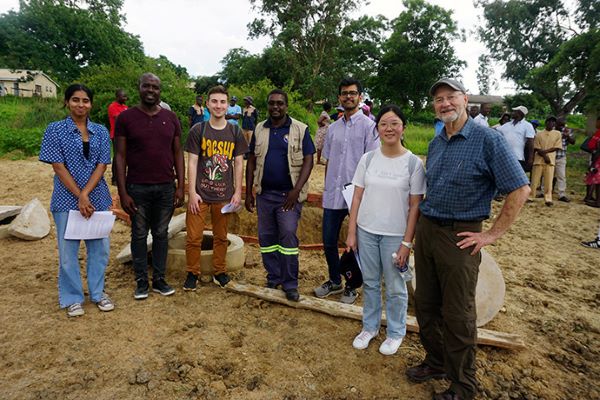
A mission school in Mutoko, Zimbabwe, Nyadire Central Primary School has teamed up with US-based engineering students at Carnegie Mellon University to install a US$25 000 biogas digester at the learning institution.
A biogas digester, at the United Methodist mission school, converts animal and plant waste to methane used for cooking, offering an inexpensive solution to deforestation.
For decades, Nyadire Central Primary School had been using firewood for cooking, costing $400 per term, and the practice was contributing to deforestation.
To address the dangers to the environment and subsequent climate change, the students with Engineers Without Borders (EWB) installed a biogas digester, which converts animal and plant waste to methane used for cooking.
Drew Harvey, Nyadire Connection programme leader arrived in Zimbabwe in January this year accompanied by four students.
“Our main objective of coming to Nyadire Mission was to ensure the biogas digester had been installed properly and to commission it for operation,” he said.
“Complex community issues rarely have a single solution. EWB’s approach integrates different engineering disciplines and exhaustively considers alternative solutions. The most important part of any such project is continuously engaging the community since they will ultimately be accountable for ongoing and sustainable operations.”
Shivank Joshi, 21, a chemical engineering student at Carnegie Mellon University touted the project and the difference it is making for the local community.
“We were driven to construct a biogas digester and our team raised funds towards this project through a combination of individual donations, scholarships and grants. A total of US$25 000 made it possible for our team to cover the construction of the digester and travel to Nyadire,” he said.
“After meeting with the people at the school, I am very proud of our team for the lasting difference the biogas project will make in their lives.”
Keerthana Karthikeyan, 19, described the biogas digester as a facility that uses waste to produce energy and fertiliser. It consists of three chambers for collecting biogas, slurry and liquid by-products.
“The feed into the digester usually consists of cow manure, pig manure and food waste,” said Karthikeyan, adding that in the digester, the organic matter fed into the tank breaks down into methane, a colorless, odourless, flammable gas that is used for cooking.
“The liquid waste is a rich fertilizer that can be used for the plants and the crops that are grown around Nyadire,” she added.
Shiyu Zhu, 20, who is studying civil and environmental engineering, said the digester has significant environmental benefits.
“It reduces deforestation thereby preserving more trees to absorb greenhouse gasses, and less air pollutants would be generated from eliminating burning firewood.
“I think the project is an ingenious idea that solves so many problems in a relatively cost-efficient way,” Zhu said.
Isaiah Lerch, 21, said the design of the biogas digester is meant to reduce the amount of maintenance required. There are no moving parts and this allows it to have a much longer lifespan than many other energy alternatives, he said.
“The main component is a 25-cubic-meter brick dome that stores the waste. This sits completely underground to protect it from the weather elements and eliminate the smell. The lifespan should be well over 25 years,” Lerch said. “The material is durable and there are no valuable parts which could be stolen.”
He said the process is more efficient, cheaper and less labor intensive than collecting firewood.
“Our goal was to create a reliable source of energy that is sustainable and allows the school to cook many meals at one time,” Lerch added.
Tendai Mushapaidze, Nyadire Central Primary School headmaster, said he is excited that the biogas digester will reduce costs.
“Each term, we needed 10 lorry loads of firewood at $40 each. We are very happy to be the pioneers of using a biogas digester in Mutoko District,” he said.







